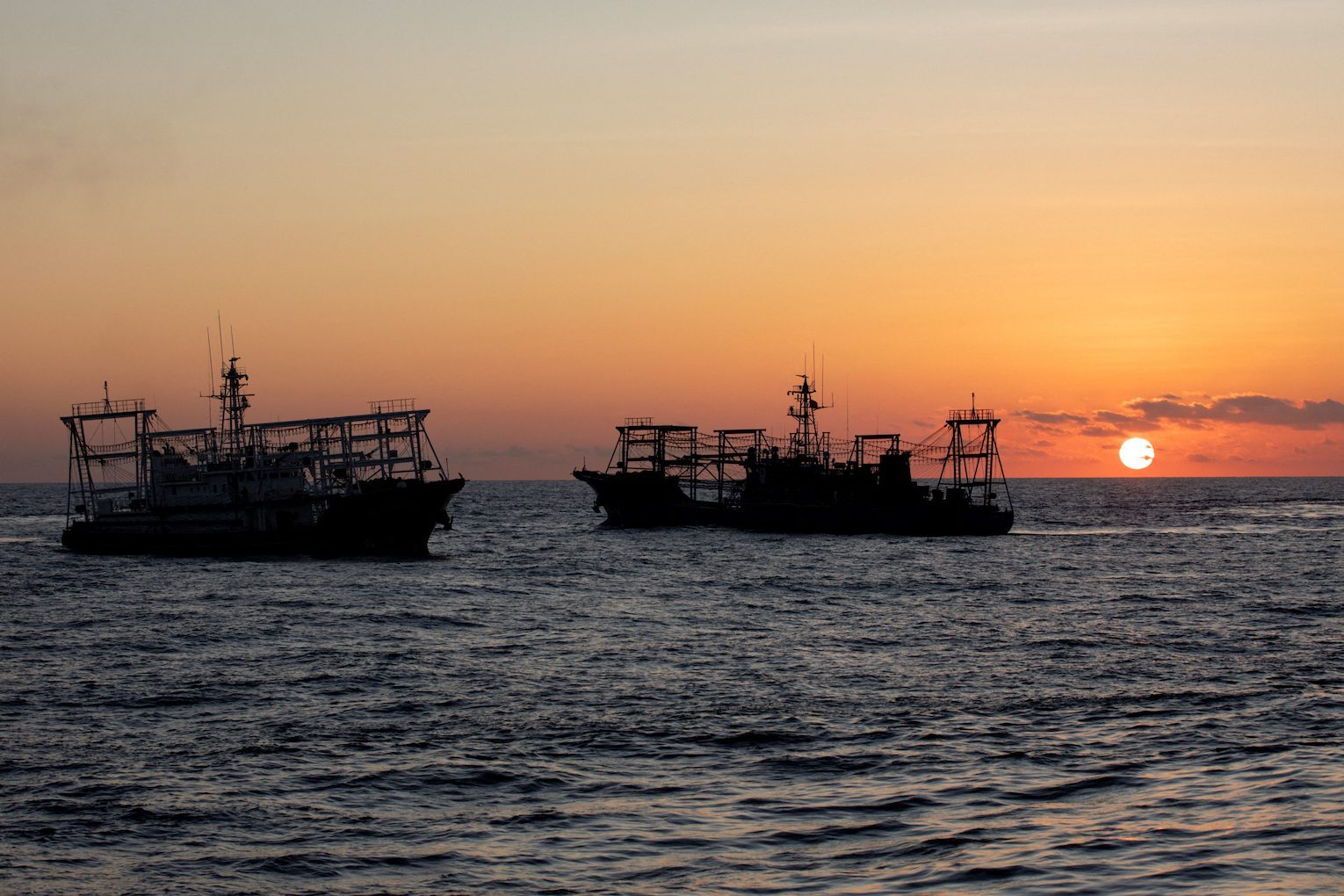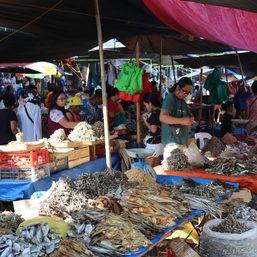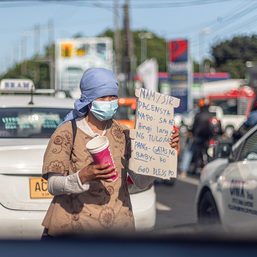SUMMARY
This is AI generated summarization, which may have errors. For context, always refer to the full article.

MANILA, Philippines – A March 2024 survey by OCTA Research painted a bleak picture of Philippines-China relations, at least in the realm of public perception. The survey, held in mid-March 2024, showed that 91% of adult Filipinos “distrust” China.
Surveys are a snapshot of a moment in time – in this case, the immediate aftermath of a March 5 water cannon incident that left four Filipinos hurt, preceded by months of heightened tensions in the West Philippine Sea that saw Beijing wield its coast guard water cannons against much smaller Philippine ships.
Near total distrust towards China of the Filipino population is not new. According to OCTA, it “[continues an] upward trend since February 2022,” or the last time the survey firm tracked a rise in trust towards China. (Important to note: the survey asked respondents about China, not about Chinese people. There is a world of difference.)
Here are other points you need to know about the OCTA survey, which was released only in June 2024:
- Adult Filipinos in Class ABC had higher trust (“A fair amount of trust”) in China, compared to classes D and E. At least 15% from the upper classes in the country said they had a fair amount of trust, compared to only 7% from Class D and 8% of Class E.
- It was only in Mindanao where respondents said they had “a great deal of trust” towards China, although this was still low – just 1% of Mindanaoan respondents.
- The highest distrust ratings were registered in Caraga (99%), Cagayan Valley (96%), Cordillera Administrative Region (95%), Bicol (95%), and Central Luzon (94%). Note, however, that error margins are higher (at +/- 6% at subnational levels, compared to the +/- error margin at the national level).
- Several regions in Mindanao were where China had highest trust than the rest of the country, edging closer to 50% – Zamboanga Peninsula (48%), Northern Mindanao (48%).
- Nationwide, educational attainment (no formal education to a post-graduate degree) did not factor into whether people felt trust or distrust towards China. Distrust ratings ranged between 81% to 88%, no matter how much education proponents received.
OCTA’s numbers echo sentiments captured by Pulse Asia in its December 2023 survey (released in January 2024), which showed that while 79% of respondents thought the Philippines should work with treaty-ally the United States, only 10% said the Marcos administration should work with Beijing.
Both surveys were released in connection with forums organized by the think tank Stratbase ADR.
It takes only a quick glance at news headlines to understand why distrust in China isn’t just on an upward trend, it’s a race to the top. From the past week alone, these have happened:
- Filipinos belatedly saw a May 19 footage of Chinese personnel playing maritime patintero aboard rubber boats in their attempt to seize food supplies meant for the troops on the BRP Sierra Madre in Ayungin Shoal
- Days later, the Philippine Coast Guard (PCG) released footage of China trying to block the emergency medical evacuation of three soldiers from the BRP Sierra Madre to mainland Palawan
- The PCG also reported harassment during a maritime scientific research mission to Escoda (Sabina) Shoal, a feature close to Ayungin or Second Thomas Shoal
- Filipino scientists, based on their mission, declared an “ecological disaster” in Escoda, just weeks after the PCG said it’s likely that the Giant Clam population in Scarborough Shoal, located further up north in the West Philippine Sea, had been wiped out by China’s fishing activities.
In response to questions about their coast guard’s attempt to block the May 19 medical evacuation, China’s foreign ministry spokesperson said the solution was simple: “If the Philippines notifies the Chinese side in advance, we can allow delivery of living necessities to the grounded warship or evacuation of personnel concerned.”
Ayungin Shoal is within the Philippines’ exclusive economic zone – as defined by United Nations Convention on the Law of the Sea and affirmed by the 2016 Arbitral Award. China has insisted that the Arbitral Award means nothing, so of course it makes sense for Beijing to insist on prior permission for Philippine missions and operations in the Philippines’ exclusive economic zone.
It has not always been this way.
Those were the days
Under the administration of former president Gloria Macapagal Arroyo, more than a majority – 54% – of Filipinos surveyed in 2005 declared a positive view of China, according to Bill Hayton in his book, The South China Sea: The Struggle for Power in Asia. “By 2011, with trade between the two countries rocketing, the positives were up to 62% with the negatives still on 31%,” he added. Hayton noted that the decline in Filipinos’ trust in China began after the Scarborough standoff in 2013, under the late former president Benigno “Noynoy” Aquino III.
Fast forward to today. Trust towards China, according to OCTA’s numbers, further dipped dramatically between October and December 2023 – months into the Philippines’ effort to make public Chinese actions in the West Philippine Sea.
In Manila, footage of the three iterations of the Unaizah May bearing the impact of China’s water cannons still induce rage, no matter the many versions of the water cannon we’ve seen.
The biggest breach of trust that made news headlines and the rounds in group chats across the military, defense, and diplomatic worlds, of course, was China’s threat to release a supposed recording of a phone call between dismissed Western Command chief Vice Admiral Alberto Carlos and Beijing’s defense attache in Manila.
The scandal for many in those circles wasn’t that Carlos had purportedly confirmed or made a deal with Beijing (which he denies), but that China would: 1) record a phone call with a Filipino general, 2) threaten to release transcripts from that phone call.
In Filipino: Pinaliit ng China ang mundo nila sa Manila (China made their world in Manila smaller). In plain English: China, in making that threat, gave other military officers and even other diplomats, reason to be more wary of interacting with them.
Making sense of Marcos
Meanwhile, Beijing and its embassy in Manila struggle to make sense of a Philippines under Ferdinand Marcos Jr.
They expected a continuation of the policy of former president Rodrigo Duterte, who acceded to China on many issues and publicly proclaimed a pivot away from Washington and towards Beijing.
Instead, they got an administration and president who promised not to yield a square inch, then told a room full of top security and defense officials during a security dialogue in Singapore: “I do not intend to yield. Filipinos do not yield.”
Chinese diplomats, in conversations that are almost always on background (no attribution), wonder out loud why the Philippines would risk trade ties, or jeopardize centuries of people to people ties, over sovereign rights in the South China Sea (Beijing sees them as mere claims).
It might be useful for them to revisit the same December 2023 survey from Pulse Asia, which indicated that 31% of Filipino respondents considered “[upholding] the 2016 Arbitral Tribunal ruling… and [promoting] a rules-based international order” the most important reason for defending the West Philippine Sea.
A close second, at 27% of respondents, said it was important to defend the West Philippine Sea to “maintain our sovereign and territorial integrity.” The protection of marine resources was the third top reason, according to those surveyed, at 23%.
Surveys (from Pulse Asia or from WR Numero Research) show that the West Philippine Sea isn’t the top priority for Filipinos. The price of basic goods, hunger and poverty, as well as jobs remain top priorities, as you would expect from the Philippines.
But an issue being lower as a “priority” (according to surveys) doesn’t mean it’s less urgent – it could mean that Filipinos rank it lower because they think that the administration is already addressing it.
Philippine foreign policy, while crafted by the President of the Republic and his men and women across different sectors in government, is still informed and can be shaped by public opinion.
Rappler’s editor-at-large Marites Vitug explained in a Rappler+ exclusive piece that Duterte’s pivot to China failed because it was unpopular and because institutions (from the Department of Foreign Affairs, Department of National Defense, to the Navy, the military, and the Philippine Coast Guard) were not on board with him.
The stakes are high in the West Philippine Sea: for the Philippines, its sovereign rights, sovereignty, and territorial integrity, and for China, its power and influence in the region and its reputation around the world.
Diplomacy is expected to allow the meeting of minds given these stakes. But when there’s no trust to be found, and apparently no reason to trust, what’s there to talk about? – Rappler.com
Add a comment
How does this make you feel?










There are no comments yet. Add your comment to start the conversation.